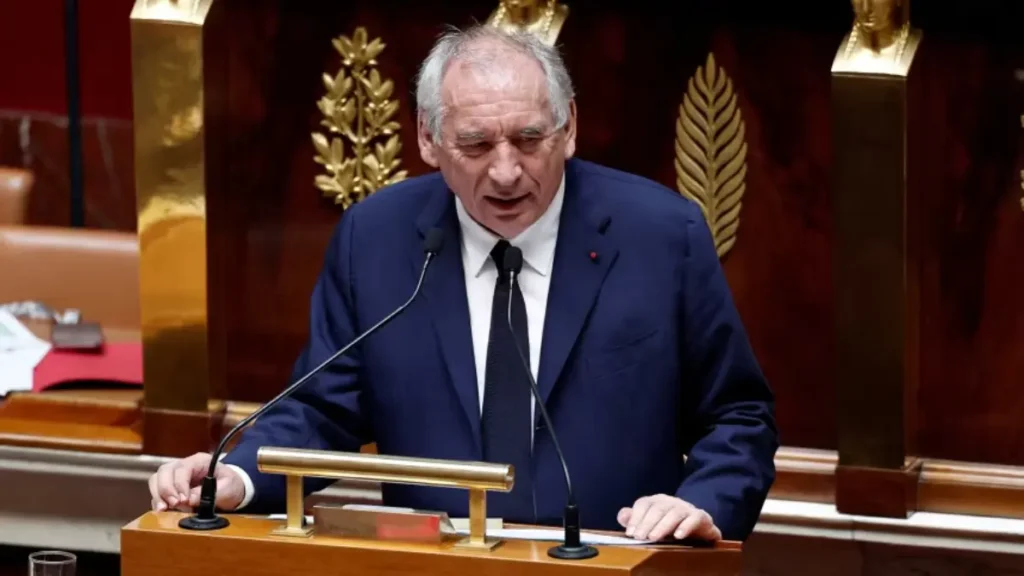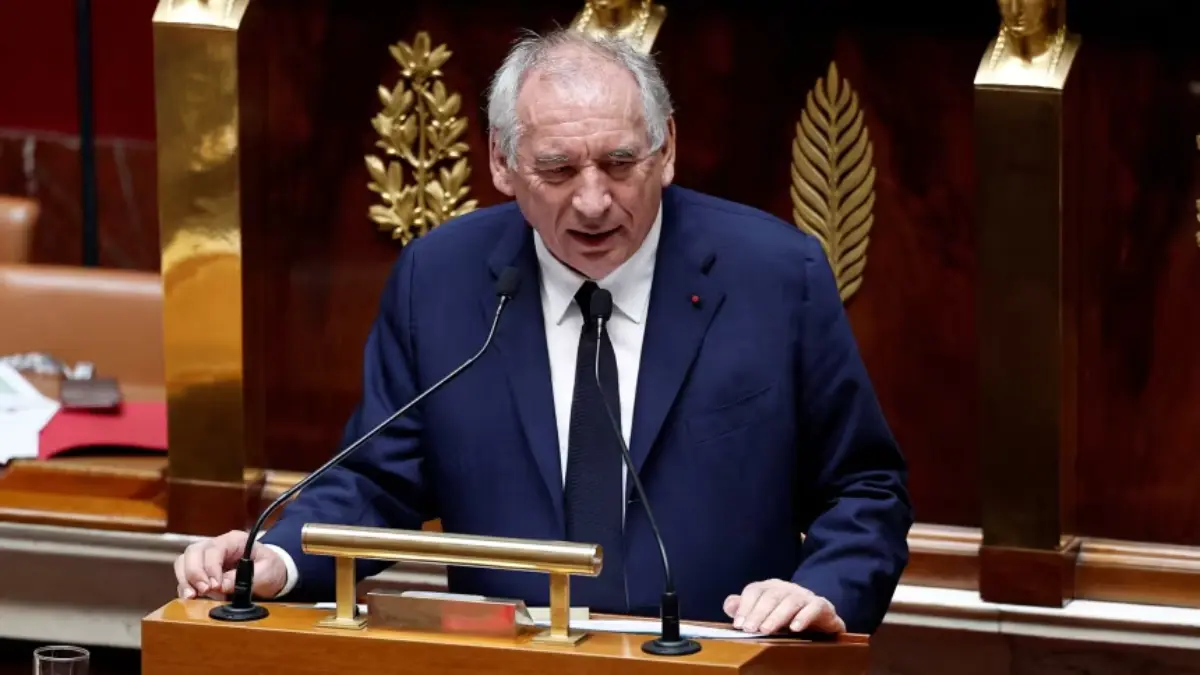The French government collapse after Prime Minister François Bayrou lost a confidence vote has triggered political chaos and economic concerns. Explore details on the fallout, fiscal crisis, and what comes next for President Macron.
French Government Collapse: Bayrou Ousted in Confidence Vote as Macron Faces Fiscal and Political Turmoil

Introduction
The French government collapse on September 8, 2025, has plunged France into yet another political crisis. Prime Minister François Bayrou was forced to resign after losing a parliamentary vote of no confidence, just nine months into office. The defeat highlights deep divisions in the French parliament and leaves President Emmanuel Macron with limited options to steer the country out of its fiscal and political turmoil.
With bond yields climbing, a looming sovereign debt downgrade, and rising discontent in the streets, the collapse has arrived at a moment of extreme vulnerability for France.
Bayrou’s Short-Lived Premiership
François Bayrou was Macron’s third centrist prime minister in less than two years, following the downfall of Michel Barnier in December 2024. His premiership was marked by attempts to push through a controversial €44 billion savings plan.
The package included:
- Eliminating two public holidays
- A freeze on government spending
- Austerity reforms aimed at stabilizing public finances
However, this plan proved politically toxic. Opposition lawmakers from across the spectrum united against Bayrou, leading to the French government collapse.
The Confidence Vote Breakdown
| Vote Result | Number of MPs |
|---|---|
| Against Bayrou | 364 |
| In Favor of Bayrou | 194 |
| Threshold to Topple | 280 |
The overwhelming rejection — 364 votes against compared to the 280 threshold — demonstrates the lack of parliamentary support for Macron’s centrist policies.
Macron’s Political Dilemma
The French government collapse places Macron in an unenviable position. He must appoint a new prime minister, but the fragmented parliament makes consensus nearly impossible.
- Centrist nominees face immediate threats of new no-confidence votes.
- The far right (Marine Le Pen’s National Rally) is pushing for snap elections, which polls suggest would benefit them most.
- The far left demands wealth taxes and opposes austerity measures.
This deadlock risks further instability as Macron seeks to avoid fresh elections that could strengthen extremist forces.
Economic Fallout of the Collapse
The timing of the French government collapse is particularly damaging because of France’s precarious fiscal situation.
Rising Borrowing Costs
Investors reacted swiftly:
- French bond yields rose above those of Spain, Portugal, and Greece.
- Concerns mounted over a potential sovereign debt downgrade expected in the coming days.
Debt Burden
Bayrou himself warned before the vote:
“Reality will remain relentless: expenses will continue to rise, and the burden of debt, already unbearable, will grow heavier and more costly.”
Fiscal Imbalance Table
| Economic Indicator | Current Status |
|---|---|
| Public Debt | Over €3 trillion |
| Budget Deficit | ~6% of GDP |
| Borrowing Costs | Rising above eurozone peers |
| Sovereign Rating Review | Pending downgrade risk |
The inability to form a stable government makes implementing fiscal reforms nearly impossible.
Opposition Parties: No Easy Solutions
The French government collapse reflects not just Bayrou’s failure, but the broader paralysis in the system.
- Socialists want to raise taxes on the wealthy and reverse Macron’s corporate tax cuts.
- Les Republicains oppose tax hikes but demand spending cuts.
- National Rally calls for protecting social spending while tightening immigration.
- Leftist coalitions push for more radical redistribution policies.
This gridlock ensures that no single prime minister can easily command a majority.
Possible Successors to Bayrou
| Candidate | Position | Strengths | Weaknesses |
|---|---|---|---|
| Sébastien Lecornu | Armed Forces Minister | Loyal to Macron, young leader | Lacks broad support |
| Gérald Darmanin | Justice Minister | Experienced, tough negotiator | Polarizing figure |
| External compromise | From opposition or technocrat | Could calm markets | Risk of immediate no-confidence |
Whoever is chosen will inherit what analysts call a “poisoned chalice.”
Public Reaction: Anger and Protests
Public trust in France’s political institutions has plummeted. Demonstrators already staged a symbolic “Bayrou farewell party” in Clermont-Ferrand ahead of the vote.
The far left has called for nationwide protests under the slogan “Bloquons tout” (“Let’s block everything”), with unions planning another mobilization on September 18.
Street protests have historically been powerful in France, and renewed unrest could deepen the political crisis sparked by the French government collapse.
The Geopolitical Dimension
The crisis does not occur in isolation. With wars ongoing in Ukraine and the Middle East, instability in Paris weakens Europe at a critical moment.
- Russian President Vladimir Putin and U.S. presidential candidate Donald Trump have openly mocked European divisions.
- France’s weakened leadership undermines EU unity, especially on defense spending and sanctions policy.
The French government collapse therefore has consequences beyond domestic politics.
Snap Elections: A Risky Gamble
If Macron were to dissolve parliament, polls suggest:
| Party/Bloc | Projected Outcome (Elabe Poll) |
|---|---|
| National Rally (far right) | 1st place |
| Left-wing coalition | 2nd place |
| Macron’s centrist bloc | 3rd place |
A new election could accelerate Marine Le Pen’s path to power, making Macron reluctant to pursue this option.
Why the French Government Collapse Matters
The collapse highlights three critical challenges:
- Political Fragmentation – Macron’s centrist project is no longer viable in a divided parliament.
- Fiscal Instability – Rising debt and borrowing costs put France’s economy at risk.
- Geopolitical Weakness – Domestic chaos undermines France’s ability to lead in Europe.
For citizens, the immediate consequence is uncertainty — about taxes, spending, jobs, and the social contract itself.
FAQs About the French Government Collapse
Q1: What caused the French government collapse?
A: The collapse followed a no-confidence vote in which 364 MPs rejected Prime Minister François Bayrou’s €44 billion austerity plan.
Q2: How many confidence votes has Macron’s government lost?
A: Bayrou’s downfall follows Michel Barnier’s ouster in December 2024, marking the third centrist prime minister to collapse under Macron.
Q3: What are the economic risks of this collapse?
A: Rising borrowing costs, a potential sovereign rating downgrade, and inability to pass fiscal reforms.
Q4: Who could replace François Bayrou as prime minister?
A: Likely candidates include Sébastien Lecornu and Gérald Darmanin, though both face major obstacles.
Q5: How has the public reacted to the collapse?
A: Protests have already been announced, with unions planning mass demonstrations on September 18.
Q6: Could Macron call snap elections?
A: Yes, but polls suggest Marine Le Pen’s National Rally would emerge strongest, making it a risky move.
Q7: How does this affect Europe geopolitically?
A: The French government collapse weakens EU cohesion and emboldens adversaries like Russia.
Conclusion
The French government collapse after François Bayrou’s failed confidence vote has left France without stable leadership at a critical moment. President Macron faces a daunting task: appointing a prime minister who can command a fractured parliament while addressing urgent fiscal challenges.
With debt rising, public trust eroding, and political extremes gaining ground, the path ahead looks turbulent. The world now watches to see whether Macron can stabilize France — or whether this marks the beginning of a deeper shift toward populist power in Europe’s second-largest economy.

